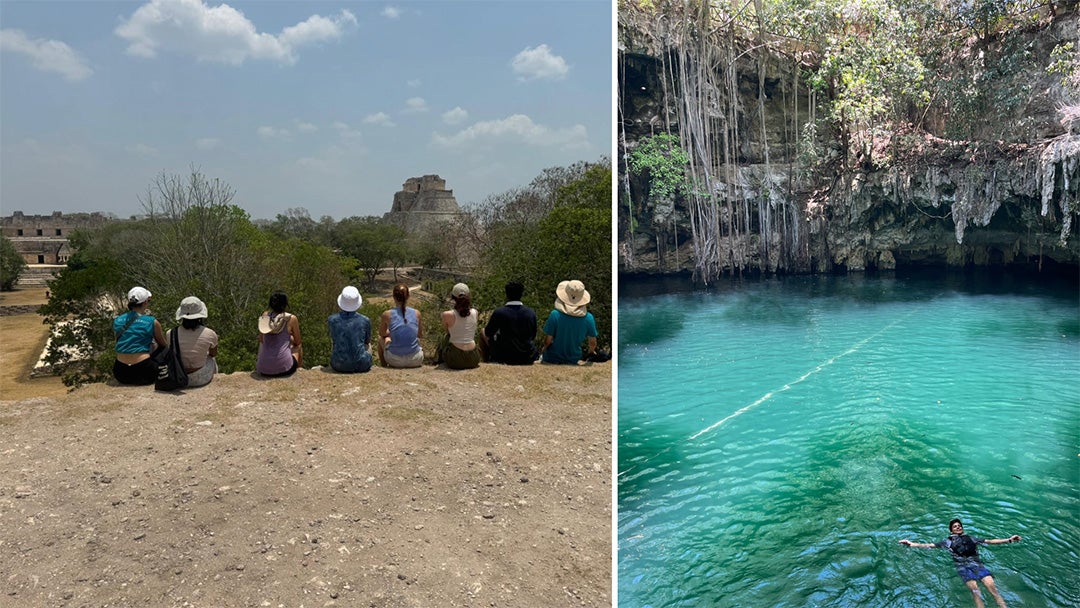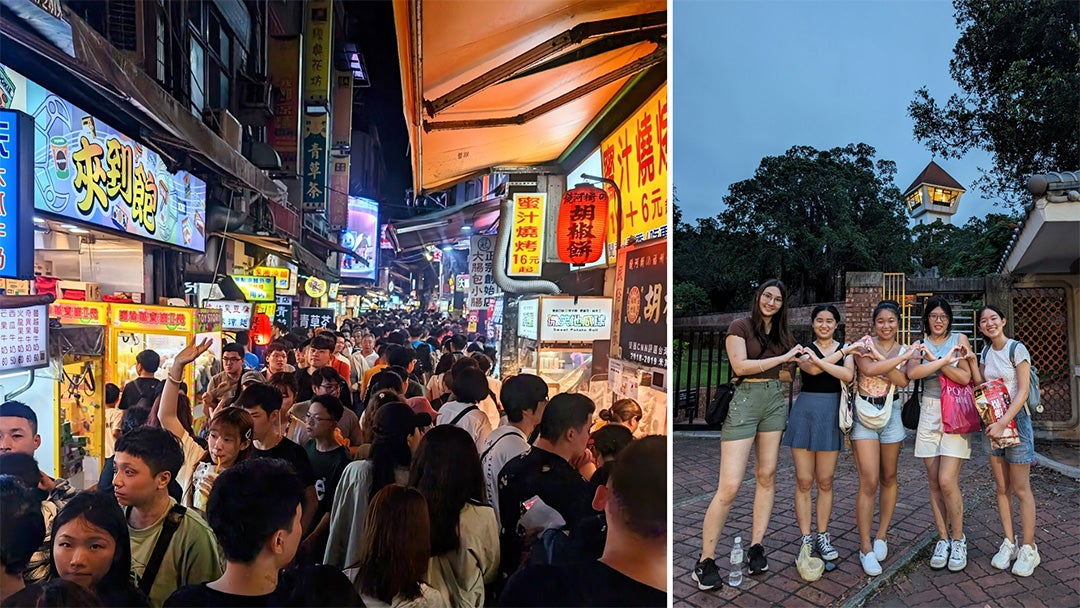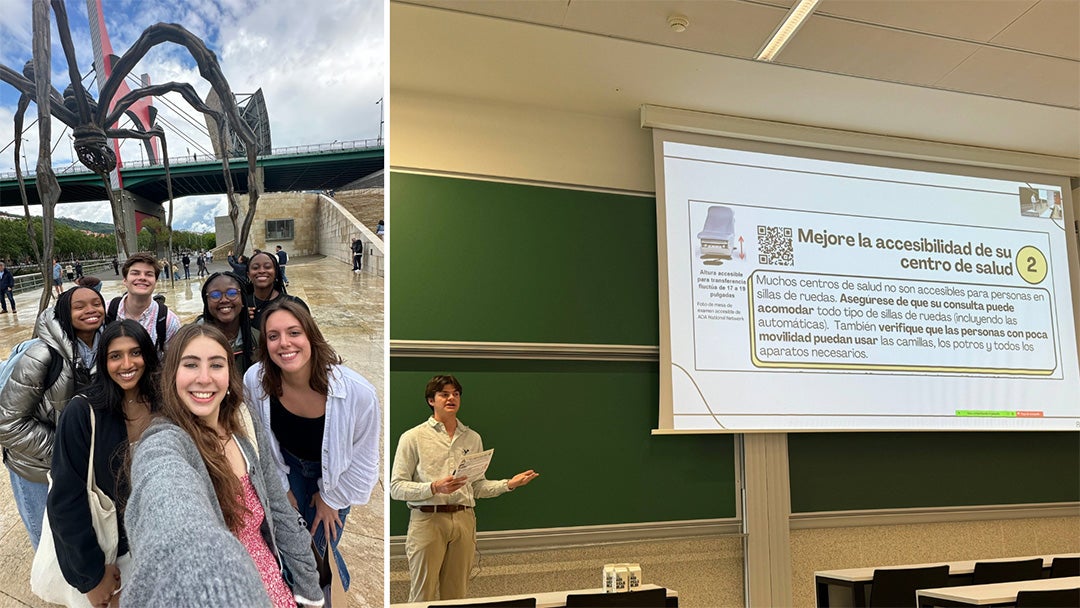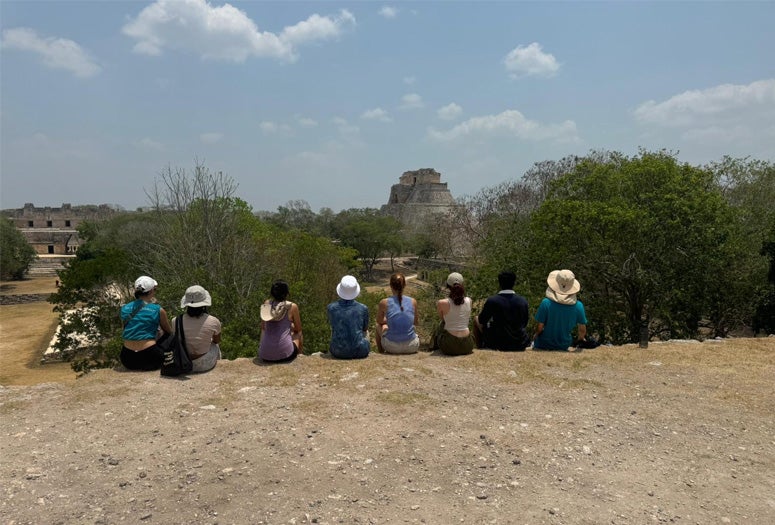
Walking through the streets of Mérida, Mexico, in the early morning light, Sammi Frey made her way to the local gym. The Rice University sophomore’s daily routine in Mexico began with this quiet time, a small slice of familiarity in an otherwise transformative study abroad experience. Fluent in Spanish but new to the rhythm of life in Mérida, Frey said she found herself navigating a different world.
“It was me just jumping into open water and seeing how it went,” Frey said.
Her experience is just one example of the impact of Rice in Country, Rice’s faculty-led summer study abroad program. Supported by several endowments, including the recently instituted Elizabeth Lee Moody International Fund in the Humanities and the Arts, Rice in Country offers students six weeks of summer coursework, homestays and cultural engagement, fulfilling a key requirement for the certificate in language and intercultural communication.
Hélade Scutti Santos, teaching professor of Spanish and Portuguese and director of the Center for Languages and Intercultural Communication, says the program “immerses students in the language and the culture of a country.” The initiative offers students the opportunity to study and live in countries where their target languages are spoken, creating a fertile environment for cultural and linguistic growth.
“You go in, you live it, you experience it,” Scutti Santos said. “You see how people live.”
After hitting the gym, Frey would return to her Mérida home for breakfast with her host family — a single mother and her three children. Frey then attended two Spanish language courses as well as a course that focused on the environmental and cultural effects of tourism on the Yucatán Peninsula. During the afternoons she explored the city’s vibrant coffee shops or bonded with her fellow Rice students over group excursions, while evenings included homework, home-cooked meals and reflections on her journey.
“If you try and stay within your shell, then you’re not going to fully immerse yourself in the experience,” Frey said.
The program isn’t limited to classrooms and daily routines. Frey and her classmates spent their weekends in Mérida exploring the Yucatán Peninsula’s cenotes and Maya ruins.
“We learned so many things both in and outside the classroom environment,” Frey said. “It’s those nuances that deepen your understanding.”
Rice in Country spans destinations such as Mexico, Spain, Taiwan, Brazil and France. Unlike traditional study abroad programs, it emphasizes complete cultural immersion. Students live with host families when possible, speak only the local language and navigate everyday tasks independently.
“One of my fondest memories from the trip was forming a friendship with the owner of a local beef noodle soup restaurant,” said junior Karina Pan, who traveled to Taipei, Taiwan, last summer. “We got to know him by just being brave and willing to get to know him in Chinese every time we visited his shop. At the end of our experience, we even gave him a parting gift and took a picture together as a keepsake.”

Scutti Santos emphasized that stepping outside of one’s comfort zone is a hallmark of the program.
“Sending students abroad is challenging because you have to accommodate students’ needs while encouraging them to face new experiences,” she said.
Frey described how she and her peers committed to speaking only Spanish while they were in Mexico, often relying on gestures and descriptive workarounds to communicate when words escaped them.
“The Spanish you learn in school is not the Spanish you’ll use,” Frey said. “But by the end of my stay, I almost sounded like a local Yucatec.”
The academic and personal growth students experience often shapes their futures in unexpected ways. Scutti Santos said that many students return home inspired to pursue further studies or careers tied to their host countries.
“Some decide to minor in the language, others want to go back and find a job there or even pursue graduate school,” she said.
Junior Nelson Mills, who is majoring in biosciences and Spanish, said his experience in Spain affirmed his decision to apply for Rice in Country because he felt it was “a perfect mix” of his areas of study.
“Speaking with professors, health care professionals and students gave me insight into Spain’s educational system, medical system and cultural values,” Mills said, noting that skills like understanding medical Spanish and suturing would directly benefit his professional trajectory.
For Frey, the program strengthened her aspiration to join the U.S. Foreign Service, blending her passion for environmental policy and cultural exchange.
“It really was a fundamental experience in helping me understand how I could adjust to other cultures,” Frey said. “It’s an opportunity that provides endless possibilities.
Rice in Country has steadily expanded since its inception in 2015. In 2024, the program sent 108 students to destinations in Brazil, France, Japan, Korea, Mexico, Spain and Taiwan. In 2025, students will have the opportunity to study in Jordan, marking the program’s first foray into the Middle East.
“Taking students to an Arabic-speaking country has been a longtime goal, and we’re excited to open this new door,” Scutti Santos said.
As the Jan. 17 application deadline approaches, Scutti Santos and past participants encouraged students from all disciplines to apply. While students in humanities and social sciences often make up a significant portion of participants, students like Mills demonstrate how the program can complement STEM fields.
“It’s a great way to learn skills that directly apply to your career while immersing yourself in a new culture and lifestyle,” Mills said.
“Rice in Country is a once-in-a-lifetime experience,” Pan said. “You’ll rapidly improve your language skills, immerse yourself in a new culture and explore a different country while building friendships with locals and fellow students.”
For Scutti Santos, the program’s transformative power lies in its ability to push students beyond the familiar.
“Yes, it’s a big commitment, but the opportunities it opens are endless,” she said.
To learn more about Rice in Country, click here.


